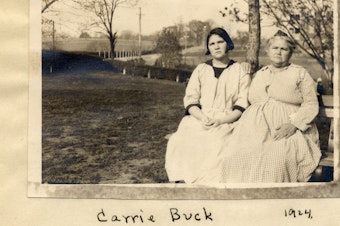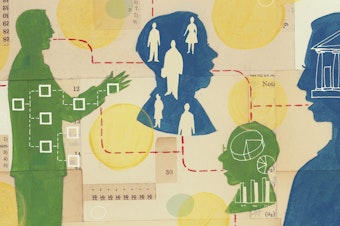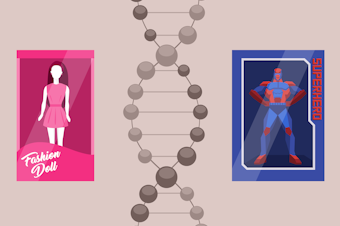Jennifer Schmidt
Stories
-

Emma, Carrie, Vivian: How A Family Became A Test Case For Forced Sterilizations
In 1924, a 17-year-old girl was admitted to the Virginia State Colony for Epileptics and Feebleminded. The superintendent of the colony classified her as "feeble-minded of the lowest grade, moron class." With that designation, this girl, Carrie Buck, was set on a path she didn't choose. What happened next laid the foundation for the forced sterilization of tens of thousands of people. This week, we revisit a 2018 episode about the eugenics movement and one of the most tragic social experiments in American history.
-

Close Enough: The Lure Of Living Through Others
Today, more and more of us are living through the people on our screens and in our headphones. It's a world just beyond our reach, where we can get the ocean without the seaweed and sunsets without clouds. Where we can experience love without the risk of rejection. It's not real, but for many of us, it's close enough. This week, we explore the dangers, and the delights, of living vicariously.
-

One Head, Two Brains: How The Brain's Hemispheres Shape The World We See
This week, we search for the answer to a deceptively simple question: why is the brain divided? Psychiatrist Iain McGilchrist explains why popular distinctions between the "left brain" and "right brain" aren't supported by research. He argues that one hemisphere has come to shape Western society — to our detriment. For more information about this episode, please visit https://n.pr/2SxITco
-

How Science Spreads: Smallpox, Stomach Ulcers, And 'The Vegetable Lamb Of Tartary'
We like to think that science evolves in a way that is...rational. But this isn't always the case. This week, we look at how information and misinformation spread in the world of science, and why evidence is often not enough to convince others of the truth. We talk with philosopher and mathematician Cailin O'Connor. For more information about this episode, please visit https://n.pr/2FO4SEW
-

The Cowboy Philosopher: A Tale Of Obsession, Scams, And Family
In 2009, an old man died in a California nursing home. His obituary included not just his given name, but a long list of the pseudonyms he'd been known to use. In this episode, we trace the life of Riley Shepard, a hillbilly musician, writer, small-time con man and, perhaps, a genius.
-

Nature, Nurture, And Our Evolving Debates About Gender
Gender is one of the first things we notice about the people around us. But where do our ideas about gender come from? Can gender differences be explained by genes and chromosomes, or are they the result of upbringing, culture and the environment? In this encore episode from October 2017, we delve into debates over nature vs. nurture, and meet the first person in the United States to officially reject the labels of both male and female, and be recognized as "non-binary."
-

Life, Death And The Lazarus Drug: Confronting America's Opioid Crisis
More than 70,000 people died of drug overdoses last year — many of them from heroin and other opioids. One of the most widely-used tools to confront this crisis is a drug called naloxone. It can reverse an opioid overdose within seconds, and has been hailed by first responders and public health researchers. But earlier this year, two economists released a study that suggested naloxone might be leading some users to engage in riskier behavior — and causing more deaths than it saves. This week, we talk with researchers, drug users, and families about the mental calculus of opioid use, and why there's still so much we're struggling to understand about addiction. For more information about the research in this episode, visit https://n.pr/2OZfuGQ.